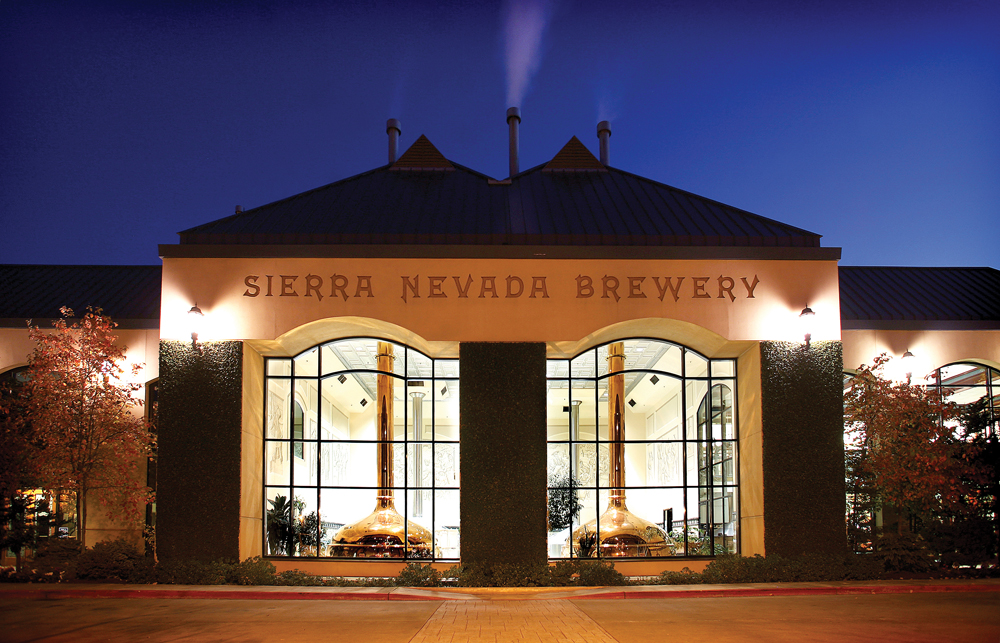Sierra Nevada Brewing Company is a testament to the American dream, however elusive that dream may seem to many in America these days with concerns about income disparity growing. Founder Ken Grossman cobbled an early incarnation of the brewery together with languishing equipment and minimal resources in the semi-rural college town of Chico in northern California. It was an age when microbrewing was a rare oddity at best. Most Americans were drinking mass-produced swill and at least one industry expert predicted that the remaining few dozen American breweries would be crushed or acquired by all but two industrial brewing conglomerates. That didn’t come to pass—in part because of Grossman—and today his company is America’s second largest craft brewery and the sixth largest brewery overall by sales volume.
While Sierra Nevada’s growth over the last three decades under Grossman’s leadership is impressive, equally so is its environmental record. It is one of the cleanest businesses in America and was named “Green Business of the Year” in 2010 by the U.S. Environmental Protection Agency. Over 99% of its solid waste is diverted from landfills. The company also provides ample benefits to employees. It has a steady track record of corporate generosity and community involvement. American dream? If Sierra Nevada were a government, it would be one of the world’s most benign.
And it makes fantastic beer.
How did this icon of American business come to be? Like many of similar ilk: through passion, almost irrational determination and a skill set honed through years of dedicated learning. Ken Grossman was the right person for the role, though success has never been as assured as it seems.
“I still have some sleepless nights,” he says from his private office at the main brewery in Chico. The room is relatively spacious with an elegant desk perhaps too large for a president who is still very much hands-on; the interview starts a little later than scheduled because Grossman was attending to some technical issues in the brewery. One wall features a big window of one-way glass that looks down on the cavernous brewery lobby and its enormous copper vats. It’s like a window onto an empire, but one built by a serf.
In his book “Beyond the Pale: the Story of Sierra Nevada Brewing Co.”, Grossman details how he and his wife had so little money in the beginning, they lived in a rural rancher they could not afford to heat with electricity, raising chickens and goats as an extra food source. Homebrewed beer was an essential part of that diet, both physical and spiritual, and marks a cornerstone of Sierra Nevada.
Grossman ran a homebrew shop in Chico and had a passion for beer long before he realized running his own brewery could be possible. In a country with now over one million homebrewers, that business endeavor was quite unique and uncertain back in 1976 when he started. He had been working in a bicycle shop while taking chemistry courses at a community college in Chico, but his homebrewing hobby reached back to his teenage years. Grossman recounts experimenting with homebrewing in 1969, shortly before high school, owing in part to a fascination with chemistry since childhood. Backed by reluctant support from his mom, Grossman’s hobby quickly took root and he homebrewed all through his teens.
The impetus for the homebrew shop was a next-door neighbor with whom he had been sharing his homebrews and who was willing to be a partner. The homebrew movement was just starting to grow in America and they smelled opportunity. A lifelong interest in tinkering and building, a passion for brewing beer, chemistry courses, experience in business management and inventory control—Grossman was acquiring all the fundamental skills for a brewery.
This article was published in Japan Beer Times # () and is among the limited content available online. Order your copy through our online shop or download the digital version from the iTunes store to access the full contents of this issue.




